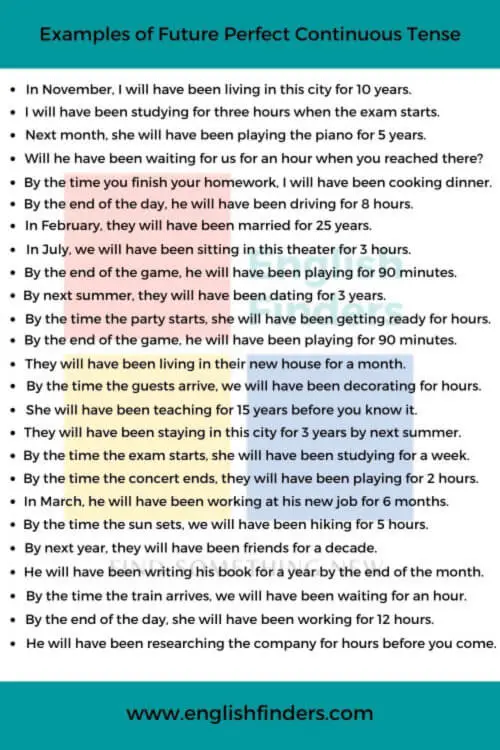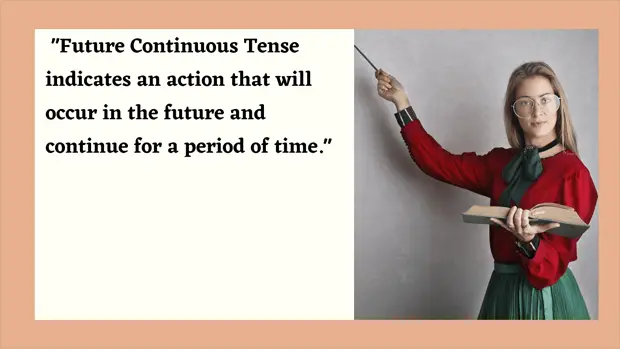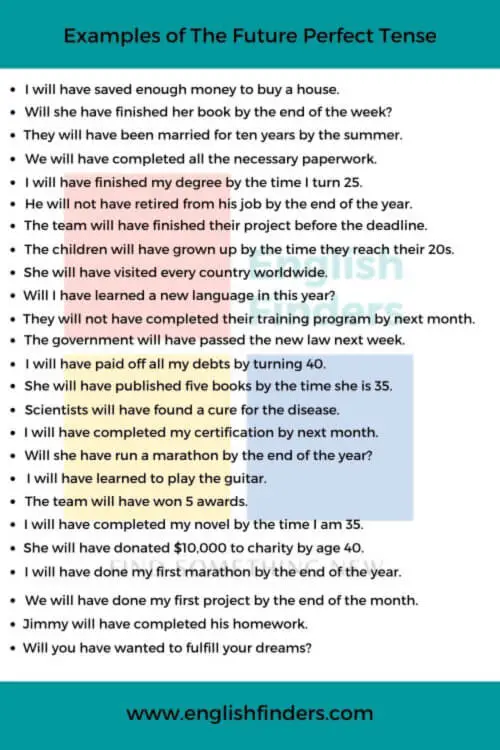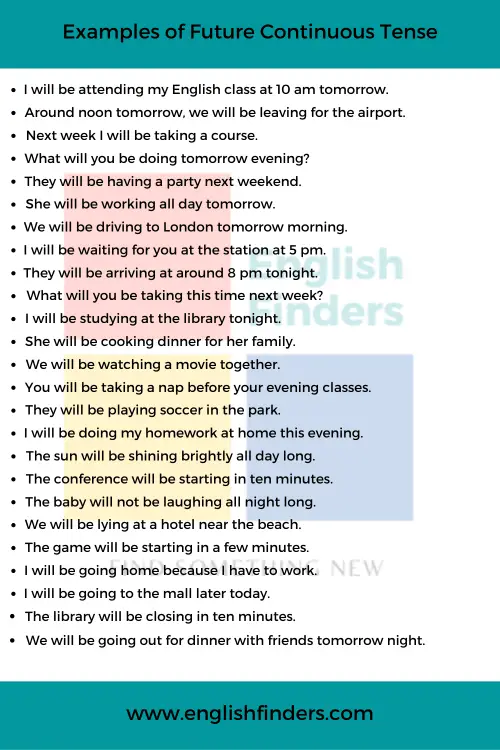Last updated on May 10th, 2025 at 04:08 pm
What Is A Future Perfect Continuous Tense?
Quick Navigation
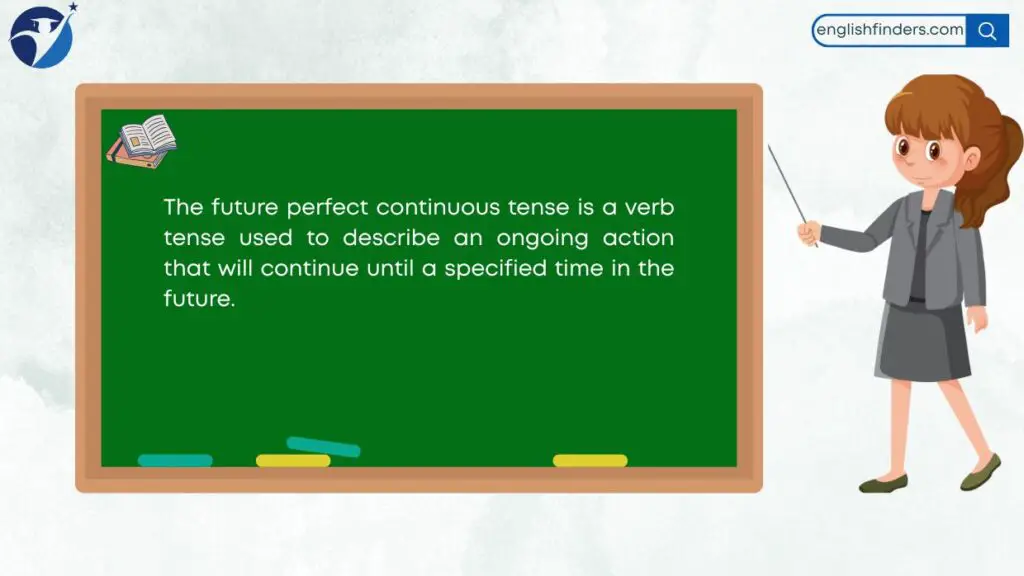
Before coming to the examples of future perfect continuous tense, we have to learn what is the definition of the future perfect continuous tense. The future perfect continuous tense is a verb tense used to describe an ongoing action that will continue until a specified time in the future. It helps us express the duration of an activity that will still be happening at a particular moment. It is formed by using the ‘auxiliary verbs’ will have been followed by the present participle (-ing) of the main verb.
For example:
- In December, she will have been working here for five years.
- We will have been waiting for two hours by the time you arrive.
These are some examples of future perfect continuous tense that illustrate its usage.
In both examples, the actions (working and waiting) started in the past and will continue for a period leading up to a future moment.
When Do We Use the Future Perfect Continuous Tense?
As we know, the Future Perfect Continuous Tense describes an action that will have been happening for a specific duration before a certain time in the future. This tense helps emphasize the length of time an action will have been in progress.
Here are the key situations where we use it:
1. To Show the Duration of an Action in the Future
This tense is often used to highlight how long something will have been happening by a specific future moment.
- By next year, she will have been studying medicine for five years.
- By 10 p.m., I will have been working on this project for eight hours.
In both examples, the actions (studying and working) will continue up to a certain point in the future.
2. To Express an Ongoing Action Before a Specific Time
We use the Future Perfect Continuous Tense when an action will still happen before a future event.
- We will have been waiting for two hours by the time you arrive.
- By next summer, they will have been living in this house for a decade.
These sentences show that the actions (waiting and living) will continue up to a certain moment in the future.
3. To Talk About Expected Results Due to Continuous Action
If an action continues for a long time, it often leads to a particular result. The Future Perfect Continuous Tense can help express this expectation.
- By next year, he will have been exercising regularly, so he will be much healthier.
- In the last month, she will have been practicing yoga daily, so she will feel more flexible.
These examples indicate long-term actions (exercising and practicing yoga) will lead to expected outcomes.
Common Time Expressions Used with Future Perfect Continuous Tense
To use this tense correctly, you need time expressions that indicate a specific moment in the future. Here are some commonly used ones:
- By then → She will have been teaching for 10 years by then.
- By next week/month/year → By next year, they will have been traveling for six months.
- For + duration → By noon, I will have been studying for five hours.
- By the time + present simple → By the time you wake up, I will have been driving for hours.
Structure of Future Perfect Continuous Tense
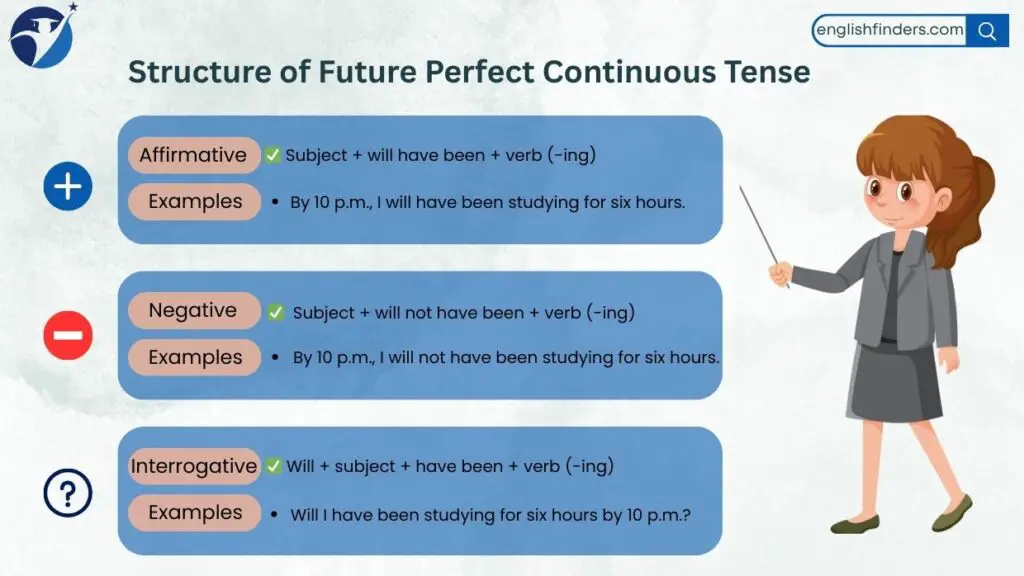
You need to follow a specific structure to use the Future Perfect Continuous Tense correctly. This tense always includes “will have been,” followed by a verb in the -ing form. Let’s break it down!
1. Affirmative Sentences (Positive Statements)
To describe an action that will have been happening for a certain period before a future point, use this structure:
✅ Subject + will have been + verb (-ing) + object/time reference
Examples:
- She will have been working at the company for five years by next year.
- By 10 p.m., I will have been studying for six hours.
- When the coach arrives here, they will have been playing football for two hours.
2. Negative Sentences
To make a sentence negative, simply add “not” after “will.”
✅ Subject + will not have been + verb (-ing) + object/time reference
Examples:
- In the next year, she will not have been working at the company for five years.
- By 10 p.m., I will not have been studying for six hours.
- They will not have been playing football for two hours by the time you arrive.
💡 Tip: You can also use “won’t” instead of “will not” to make it more natural.
For example: He won’t have been waiting for long by the time we get there.
3. Interrogative Sentences (Questions)
To ask a question using the Future Perfect Continuous Tense, follow this structure:
✅ Will + subject + have been + verb (-ing) + object/time reference?
Examples:
- Will she have been working at the company for five years by next year?
- Will you have been studying for six hours by 10 p.m.?
- Will they have been playing football for two hours by the time we arrive?
Short Answers
When responding to a question, use “Yes” or “No” followed by the subject and “will/won’t”:
❓ Will she have been studying for three hours by noon?
✅ Yes, she will.
❌ No, she won’t.
50 Examples of Future Perfect Continuous Tense
Let’s see the 50 useful examples of the Future Perfect Continuous Tense:
- I will have lived in this city for 10 years in November.
- Tomorrow morning, he will have been studying for 12 hours straight.
- By the end of the year, we will have been working on this project for two years.
- I will not have been studying for three hours when the exam starts.
- Next month, she will have been playing the piano for 5 years.
- Will he have been waiting for us for over an hour when you reached there?
- By the time you finish your homework, I will have been cooking dinner.
- He will have been driving for 8 hours by the end of the day.
- In February, they will have been married for 25 years.
- We will have been sitting in this theater for 3 hours in July.
- The employees will have been setting up for hours by the time the store opens.
- By the time the party starts, she will have been getting ready for hours.
- Will you have been traveling for 10 hours before we reach our destination?
- By the end of the game, he will have been playing for 90 minutes.
- They will have been living in their new house for a month.
- We will have been decorating for hours by the time the guests arrive.
- She will have been teaching for 15 years before you know it.
- They will have been staying in this city for 3 years by next summer.
- By the time the exam starts, she will have been studying for a week.
- By the time the concert ends, they will have been playing for 2 hours.
- He will have been working at his new job for 6 months in March.
- By the time the sun sets, we will have been hiking for 5 hours.
- She will have been practicing the guitar for 10 years.
- By next year, they will have been friends for a decade.
- By the time the event begins, they will have been planning it for months.
- He will have been writing his book for a year by the end of the month.
- They will have been running their business for 5 years.
- By the time the train arrives, we will have been waiting for an hour.
- By the end of the day, she will have been working for 12 hours.
- They will have been in their new job for a month by next week.
- By the time the party ends, they will have been dancing for hours.
- In February, he will have been studying abroad for a semester.
- By the time the show starts, we will have been standing in line for an hour.
- By the end of the concert, she will have been singing for 2 hours.
- By next summer, they will have been traveling the world for a year.
- We will have been camping for 8 hours by the time the sun rises.
- She will have been working at the company for 5 years.
- Next month, they will have been learning French for a year.
- By the time the race ends, he will have been running for 3 hours.
- They will have been saving up for their dream vacation for 5 years.
- By the end of the game, they will have been playing against each other for an hour.
- She will have been warming up her voice for 30 minutes before you think about it.
- By next summer, they will have been building their dream home for 2 years.
- By the end of the month, he will have been volunteering at the shelter for a year.
- By the time the storm passes, we will have been hunkering down for 2 days.
- They will have been planning their wedding for 2 years by next year.
- They will have been preparing their presentation for 10 days.
- She will have been taking online classes for 6 months.
- They will have been working on their garden for 3 years.
- He will have been researching the company for hours before you come.
In conclusion, the future perfect continuous tense is a useful tense for discussing ongoing actions that will continue until a specific point in time in the future. It can be used to talk about the duration of time, ongoing actions, and long-term plans. To have a clear idea about this tense, writers can add depth and precision to their language, helping to convey complex ideas and events clearly and concisely.
Exercises on the Future Perfect Continuous Tense
Exercise: 1
Complete the sentences with the correct form of the verb in the Future Perfect Continuous Tense.
- By the time she arrives, we __________ (wait) for two hours.
- By next year, he __________ (work) at this company for a decade.
- By 5 p.m., they __________ (play) football for three hours.
- She __________ (study) for her exams for weeks by the time they start.
- In the following year, I __________ (live) in this apartment for six months.
- When you get here, we __________ (cook) dinner for an hour.
- In 2030, scientists __________ (research) space travel for many years.
- When you finish your homework, your mom __________ (clean) the house.
- We __________ (drive) for eight hours by the time we reach our destination.
- By next summer, she __________ (train) for the marathon for a year.
Exercise: 2
Choose the Correct Sentence:
A) In the next year, I will have been learn French for two years.
B) In the next year, I will have been learning French for two years.
A) He will have been running for an hour when the sun sets.
B) He will have been run for an hour when the sun sets
A) By the time we arrive, she will have been waiting for us for 30 minutes.
B) By the time we arrive, she will have been waited for us for 30 minutes
A) By next year, they will have been worked on this project for three years.
B) They will have been working on this project for three years by next year.
A) The baby will have been sleeping for two hours by the time we get home.
B) The baby will have sleep for two hours by the time we get home
Exercise: 3
Make a Sentence Using the Given Words:
- (She / work / for six months / by next June)
- (They / practice / football / for five years / in 2026)
- (We / travel / for eight hours / by the time we reach Paris)
- (He / wait / for an hour / when the bus finally arrives)
- (I / study / for two hours / when my friend calls)

Azizul Hakim is the founder & CEO of englishfinders.com. He is a passionate writer, English instructor, and content creator. He has completed his graduation and post-graduation in English language and literature.

